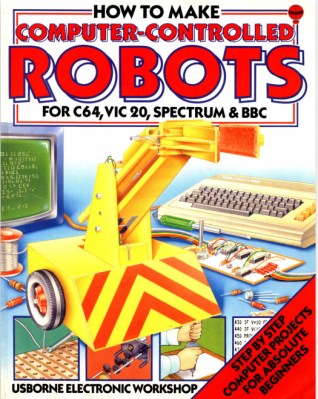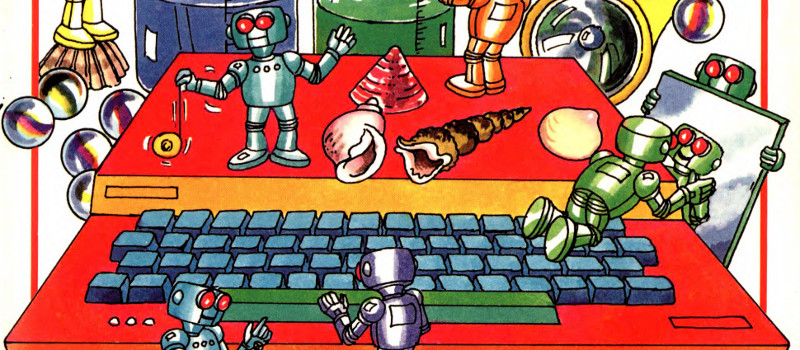Children of the 1980s who had an interest in technology were lucky indeed. As well as the first generations of home computers at their disposal they had the expectation to program them, something which the generation that followed had lost.
Traditional children’s publishers enthusiastically embraced the home computer boom, and probably for the only time in history there were books aimed at children covering subjects like machine code, or interfacing to microprocessors.

If you are British, the most memorable of these books came from Usborne Publishing. Their format of colourful cartoons and easy to digest layout have made them something of a cult object among the now-grown-up generation who first received them, and Usborne themselves have cleverly exploited their heritage to promote their current offerings by releasing some of them as PDFs. And now, to promote their latest title, “Coding For Beginners Using Python”, they’ve released five more (scroll down to see). Titles are “Practice Your BASIC”, “Better BASIC”, “Computer Controlled Robots”, “Experiments With Your Computer”, and “Keyboards & Computer Music”, which join the fifteen they’ve already released.
Obviously they are heavily based around the microcomputers of the 1980s, but of course for most Hackaday readers that will be their chief attraction. Either way they’re an interesting read, and should you happen to have a few old micros lying around then maybe you could have a go at some of the projects.
If the BASIC listings are a little foreign to you, might we suggest some places to find BASIC information.
















Wow I’ve been doing a raspberry Pi physical computing course lately and these Usborne books keep coming to mind, I would borrow them from the library when I was in primary school on a rotating basis. I’m going to have to buy the whole series for my boys :)
Fond memories of my chilhood ! I’ve read them cover to cover a lot of times before even getting a computer. Some say that Robots are our future, I dare to say that Robots are part of my history :)
Local library had a copy of “Practical things to do with with a micro computer” which I almost had on permanent issue for a time. Included basics of programming, soldering, prototyping, everything. Their simple ‘cartoon’ style made it much more approachable (and easier to talking the parents into buying me a soldering iron for christmas).
That book “How to make Computer-controlled robots” was a book I owned. I loved it. I desperately wanted to build robots when I was a kid. My father had the know-how, but not the time really. I would flip through that book imagining building a robot.
It took me 20+ years to get there, but I’ve finally build robots of my own, and programmed them. Nothing quite so complex as the mobile articulated arm featured on the cover, but I’ve done some cool stuff. I definitely appreciate these books.
I made my cool robot from this book as a high school project at the age of 16-ish in 1990 – with my trusty old VZ300 (Z80 computer) https://www.youtube.com/watch?v=7LMxXY12E_I
Oh wow! I adored “How to Make Computer-Controlled Robots” as a kid, even though I didn’t have a computer. I read it until it fell apart, imagining how to make all these things that I could never quite afford to to – but I never lost that bug and now I’m a professor of robots. Those books were great!
What exactly is a professor of robots?
A professor of robots is one who professes (teaches) about robotics, of course! I’m a Senior Lecturer in Mechatronics, of which robotics is a subdomain. Senior lecturer is the Oz equivalent of Associate Professor.
Oh, so different than a professor to robots.
https://assets.pando.com/_versions/2013/09/screen-shot-2013-09-08-at-11-39-13-pm_featured.png
Only in reverse.
Oh wow, I had nearly all of these when I was a kid, basically taught me Basic and even some 6502 assembler. Fond memories adapting the programs to run on my C64.
They were also common in Australia.. I own a few of this series.
Now between my friends we own most of the machines in the book and a lot of the hardware, we can finally do some of the projects!
Usborne Publishing? Odd they never got in trouble for that.
In trouble for *what*, from whom? The guy who started it is called Peter Usborne – I reckon he’d have the rights to his own name.
I’m happy to see this book again but those robots really need optoisolators on the computer end.
Holy shit, I fucking read that book in Elementary School. I even found a copy and bought it on eBay. I literally built this robot, twice. So many fond memories.
That might even be my scan that turned up on Google Image Search, because there were none until I scanned it years back.
Edit: OK maybe not, Usborne has scanned them and made them available for free via PDF on their site. Very cool.
Usbourne did a lot to open up all sorts of things to kids from my era. I still have many of their books on a variety of fields and they definately led me into more technical books as I got older from the library. Today the local libraries in the UK are often under threat of closure. I’ll admit I haven’t been to one in a very long time, but as a kid I was there every week learning about something new.
I used to checkout a book in the library all the time that had similar instructions but for a mobile robot just like the robot book but it was using an Apple II the colored artwork was the same style too.
Beautiful books, they would probably be able to sell them if they published hard copies.
Oh my gosh:
“Test failure
Ask someone else to check the circuit and connections if any test fails, as it is easy to miss something. Use fresh batteries. If the circuit still does not work, pack it carefully with enough stamps for return postage and send it to:
Electronics Advisor, Usborne Publishing, 20 Garrick Street, London WC2 9BJ”
That’s at the bottom of page 48 in the Computer Controlled Robots book. They were willing to test your circuit for you, and presumably tell you what was wrong with it. I wonder if anyone ever took them up on their offer?
It’s a great way to give people confidence that it will work. Heathkit did something similar and used the slogan “We won’t let you fail”
I remembered that I learned programming from books with robots and filing cabinets to explain the inner workings of computers. But despite a lot of searching, I wasn’t able to find them again. Until today! Thanks Jenny!
The “Programming Tricks & Skills” and “Machine Code for Beginners” are the books that got me started down a 30 year deep rabbit hole. I checked out the German editions from our local library on a semi-permanent basis.
It’s great seeing that they’re still going strong releasing these quality of books for the new generation and the current languages (I see one for python which I’m learning now).
I’ve got a mint Epson turtle that used to be NIB!, alas over the last 3 years, the box got damp and disintegrated.
The thing survived because it was still sealed in the bag.
Unfortunatly I haven’t found the time to see and work out how to run it on modern electronics.
We had these in NZ too, they were essential reading from the libraries, I remember typing out the Skier game line by line, and the pushing of the ‘play’ and ‘record’ buttons together on the tape drive…..
Really interesting to read all your comments. Those were heady days – it’s very rewarding to see how much people enjoyed the books. Thanks everyone! LisaW Usborne Publishing
“Children of the 1980s who had an interest in technology were lucky indeed.”
I couldn’t disagree more!
My own childhood kind of straddled the late 80s, early 90s so maybe you were coming from more of an early 80s perspective? I used BASICA in the late 80s and QBASIC in the 90s. QBASIC was so much better!!! But.. I didn’t really want either. I wanted something that could compile to an executable! I felt my hours spent coding with FOR/NEXT/GOSUB were kind of wasted because nobody would ever use anything I wrote. Computers were getting popular enough that actual people I knew might be interested in trying out some new application but they weren’t going to ever fire up a BASIC interpreter! I used to drool over C compilers I found listed in catalogs for 100s of dollars back then when a dollar was worth more.
Now compilers are free but a kid doesn’t have to even go that far. The new BASIC is Python and you can “compile” your Python. (actually it just wraps your interepereted text in an executable interpreter but the effect is the same).
Ever get interested in anything beyond programming? Something a little more to do with physical hardware? Yah, that really sucked as a kid back then. The internet was something college and government people played with that we didn’t even know about. Want to learn some electronics? You can’t look it up on your computer. Go to the library!
And.. oh.. what a selection the libraries carried. Mostly really great “…. for boys” books that probably launched a lot of engineering careers… in the 1940s when they were written! Go to the neighborhood drug store and pick up a vacuum tube or down to your basement coal pile to find a piece of galena! That’s how the projects in those books always started! Sure… maybe if Doc Brown would have lent me his Delorean. But then I could have done better traveling to the current present and buying a sack full of Arduinos, sensors and even a Raspberry Pi all of which are now available even for a mere paper boy’s income.
Geeky kids today are the ones that have it made! We have nothing to get nostalgic about. Well.. except for sledding and snow forts. Damn global warming! Still, I wish I had been born 30 years later!
Oh.. and because there is always somebody who thinks QBASIC could compile…
QBASIC had absolutely no compile feature. QBASIC was a cut down free version of QuickBasic. They were not the same thing. QuickBasic had the ability to compile and also the ability to split a program up between multiple files. This stuff was removed to make QBASIC. QBASIC came free with DOS but Quick Basic was out of a child’s league price wise in the early days. It only became something a typical child might be able to save up for after the world had moved on from DOS to Windows thus making it obsolete.
Somewhere in the MSDOS 6x versions was a version that compiled. I think it was the one with the “good” version of doublespace before they had legal issues with stacker or whoever. 6.2??
How big is “compiled” Python? I’d love something better than Posix Shell for use in initramfs’s and full Python is way too huge.
Thank you very much for the information about the official download links from usborne! I love these old books and have even bought some of them used just for the fun and 80ies feeling of reading them!